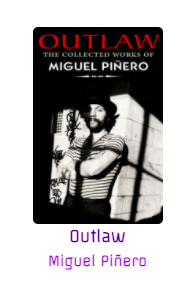April is National Poetry Month
Featured art by: Martin Wong, a Chinese-American painter and Miguel Piñero’s former lover, c. 1988
This month, we want to honor the late poet, playwright, actor, and outlaw, Miguel Piñero.
Born in Puerto Rico in 1946, Piñero and his family relocated to New York City when he was 4 years old. Raised in the Lower East Side, Miguel’s father abandoned their family when Miguel was just 8 years old, leaving his mother to raise five kids on her own. As the oldest of his siblings, Miguel began to steal food to feed himself and his siblings out of necessity, and was first criminally convicted at 11 years old. Piñero’s life was fueled by crime, streetgangs, drugs, and a knack for the arts.
Convicted on counts of theft and armed robbery, Piñero spent time incarcerated at Rikers Island and Sing Sing prison, during which he kept busy writing plays and poetry.
Excerpt from: Black Woman with the Blond Wig On
Dedicated to those magnificent black women & their blond wigs
Black woman with the blond wig on
you’re living an illusion.
Think that head blanket
bought from macy’s on a lincoln sale
will make the residents of the forest hills
lay out a black carpet to their blond streets
because you have some blond horse hair on?
Black woman with the blond wig on
are you playing James Bond in blond
secret agent in charge of repression
congo blood?
“Ethnicity plays an important role in all of Piñero’s work,” writes Jorge Iglesias from the University of Houston, “in keeping with the native Hispanic conscious-ness as an ethnic group that must struggle for its rights and for equality in a society dominated by a different group” (Outlaw). Piñero’s work centers strongly around Puerto Rican identity in the United States, self-identified Nuyorican, and he co-founded the Nuyorican Poets Cafe – utilizing art as a form of resistance against hegemonic cultural expression.
Jorge Iglesias writes, “Piñero wrote bilingual plays which reproduce the language of a culture that is conscious of its roots in the oral tradition” (Outlaw). Piñero’s represent not just influential prison literature, but the tough reality of being Puerto Rican in the Lower East Side, engulfed in criminality, addictive substances, and a unique Hispanic culture.
Piñero’s play, Short Eyes, “depicts a society divided by racial prejudices and exposes a prison system in which citizens are not reformed but led to brutality” (Iglesias, Outlaw). Short Eyes was critically acclaimed – it won the New York Drama Critics Circle Award, an Obie Award, and was nominated for six Tony Awards. Short Eyes was also adapted into a film, and Miguel’s life was commemorated in the biographical film, Piñero. Piñero also received one of the highest recognition in scholarship of arts – The Guggenheim Fellowship.
Another element of Pinero’s work is its abundant profanity, which detail the setting of the Lower East Side in raw, pure passion. As Carlos Morton mentions, “The Nuyorican scene is a street scene, a theatre of the barrio. Its ghetto artists paint the dialectics of survival” (Outlaw). This dynamic to Pinero’s work hits with unfiltered and unapologetic prowess.
Excerpt from: Declaration 1968
YES, MOTHERFUCKERS, I AM MILITANT
this child was innocent,
of the big money plays
was ignorant of the teachers’
racist ways…
this child knew not why her brother died
in a foreign land—killed by her brother’s hands—
YES I AM A RADICAL
YES, YOU DEGENERATE MOTHERFUCKERS,
I AM A REVOLUTIONARY
Miguel Piñero died in 1988 from cirrhosis, he was 40 years old. Piñero’s romantic relationships included men and women, and his legacy will cement his contributions to art in its various forms. From outlaw to poet to playwright, Miguel Piñero’s life and work is a must-read and you can listen to over 35 of Piñero’s poems, some previously unpublished, and 10 of his plays, including the esteemed Short Eyes, here on Abantu Audio.
The title is Outlaw: The Collected Works of Miguel Piñero



